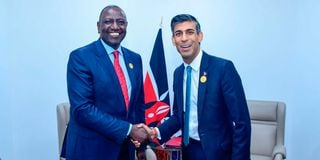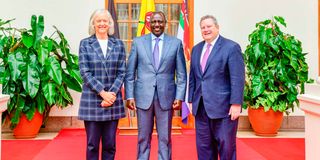Premium
Ruto warms up to Western nations in a shift from East

President Willliam Ruto with the UK Prime Minister Rishi Sunak during the United Nations Climate Change conference COP 27, at Sharm El Sheikh Congress Centre, Egypt.
President William Ruto’s administration has shown an early preference for close diplomatic relations with Western nations, indicating a possible departure from his two predecessors who leaned heavily on emerging Eastern giants led by China to fund and develop economic projects.
Two months since he took office, President Ruto has had multiple economic engagements with diplomats and leaders of Western countries, pointing to a departure from the ‘Look-East policy’ of the past 20 years that was started by the late President Mwai Kibaki and deepened by Uhuru Kenyatta.
Dr Ruto a fortnight ago hosted a US delegation led by Deputy Secretary of Agriculture, Dr Jewel Bronaugh, at State House Nairobi where he announced that “Kenya is ready for more trade deals with the US under the AGOA programme".
In the delegation were US ambassador to Kenya Meg Whitman, Nebraska Secretary of State Bob Evnen and Nebraska deputy Secretary of State Cindi Allen, among others.
It was not the first time a US delegation was visiting the State House in the last two months. He had earlier held talks with Ambassador Mike Hammer, the US Special Envoy for the Horn of Africa and Secretary of State Antony J Blinken.
In September, Dr Ruto was hosted to a dinner by King George III when he flew to the United Kingdom to attend the burial of Queen Elizabeth II, his maiden trip after ascending to power.
The Head of State later flew to the United States to attend the United Nations General Assembly where, besides addressing world leaders, he was also hosted to dinner by US President Joe Biden.

US President Joe Biden, President William Ruto and First Lady Rachel Ruto.
UK deals
On Monday, Dr Ruto and UK Prime Minister Rishi Sunak signed a deal for a new multi-purpose dam to be built in Kitui and Tharaka Nithi counties.
The project will cost Sh425 billion, making it Kenya’s second-most-expensive infrastructure piece after the Standard Gauge Railway (SGR) that was constructed by China Road and Bridge Corporation (CRBC). The deal between Kenya and UK is part of six projects worth Sh500 billion to be fast-tracked under a new UK pact signed on the sidelines of the climate conference COP27 in Egypt.
The green investment programmes — in energy, agriculture and transport — were framed as flagship projects of the UK-Kenya Strategic Partnership, which is an ambitious five-year deal signed "to unlock mutual benefits between the two countries".
The deal will also fast-track the Nairobi Railway City with Sh5 billion investment that includes the regeneration of central Nairobi, anchored on a new central rail station connected to Bus Rapid Transit. The project has been developed with technical assistance from the UK government. UK architects (Atkins) won the deal to design the new station.
Dr Ruto’s administration announced the approval of genetically modified organisms (GMOs) shortly after taking over, showing a dalliance with powerful Western multinationals that are known to actively push for their business interests in diplomatic circles.
IMF relations
The new government has also shown keenness to expand relations with the International Monetary Fund (IMF), a financial agency of the United Nations that has imposed tough economic conditions on Kenya. Dr Ruto has additionally hosted delegation after delegation of envoys from the West at State House and declared the country’s commitment to strengthening diplomatic ties with them.
Foreign Affairs Cabinet Secretary, Alfred Mutua, in an interview told the Nation that Nairobi would engage both the West and the East "in specific areas of common interest", and not necessarily face the West.
He says Kenya is expanding its bilateral relations with European countries while retaining friends from the East.
“We are neither going west nor-east. We are world leaning. We have friends in both the West and East who have something to offer. We have friends in the West who want to invest in Kenya and roll-out projects and at the same time, we have loyal friends in the East who want to continue with what they have been doing,” says Dr Mutua.
“We have a strong relationship with Brazil yet we do not sell anything there, therefore, we are looking at the whole of South America. We are also expanding our bilateral relations with some European countries like Estonia and Finland. We also want to increase trade with countries like Singapore, and Malaysia among others,” he adds.

President William Ruto with US Special Envoy for the Horn of Africa Mike Hammer and US ambassador to Kenya Meg Whitman at State House, Nairobi.
Chinese-linked companies have for the past 10 years of Jubilee administration rode on warm diplomatic ties between Beijing and Nairobi to win major infrastructure projects. Engineering firm China Wu Yi Construction Company Limited and China Road and Bridge Corporation (CRBC) have been involved in multi-billion infrastructure projects, among them the Thika super-highway, which was constructed during President Kibaki’s administration, the SGR and Nairobi Expressway built during Mr Kenyatta’s tenure. When Kibaki took over in 2003, Western countries were heavily funding major projects in African countries, Kenya included.
The support by the West always came with conditions for the benefiting countries to ensure democratic reforms and credible elections. This made several African countries turn to the East where they could attract funds for major capital projects without such conditions. The President has also hosted the Chinese Ambassador to Kenya Dr Zhou Pingjian at State House, but not as frequently as he has done with western diplomats.
In the meeting with Dr Pingjian held on October 18, President Ruto expressed confidence that trade between Kenya and China will increase. Prof X.N Iraki of the University of Nairobi says pressure from the West and negative publicity of Chinese engagements with Africa, the so-called debt diplomacy, could be the reason for the shift.
He cites the threat by the new administration to disclose contracts with China on the Standard Gauge Railway (SGR) as some of the signs that the country was not keen on following in the footsteps of Mr Kenyatta and the late Kibaki.
“In the long run, China is unlikely to withdraw because of her strategic interests in Africa espoused by the one belt, one road project. Also, the fact that China is emerging as a countervailing force to the US both in geopolitics and geo-economics,” says Prof Iraki.
Foreign policy
National Assembly Minority Leader Opiyo Wandayi says Kenya appears to be incoherent in its foreign policy and is operating on opportunism.
“We are yet to see a coherent foreign policy from this administration. So it is difficult to tell whether there has been any shift to the West. I think it is just a matter of opportunism on the part of the regime leadership. Nothing about principles or best interests of the country,” says Mr Wandayi.
Dr Duncan Ojwang’, Nazarene University’s law school dean, says Kenya choosing to strengthen its ties with the US is for geo-interests, geo-politics and geo-strategy but China still remains a partner.
“It is during the cold war that a country could have not engaged both the East and the West, right now you can engage both in areas of common interests. The release of the SGR contract is a sign of a shift and the country is basically saying we will continue working but we can no longer rely on you entirely.”
Additional reporting by Onyango K’onyango. [email protected]





